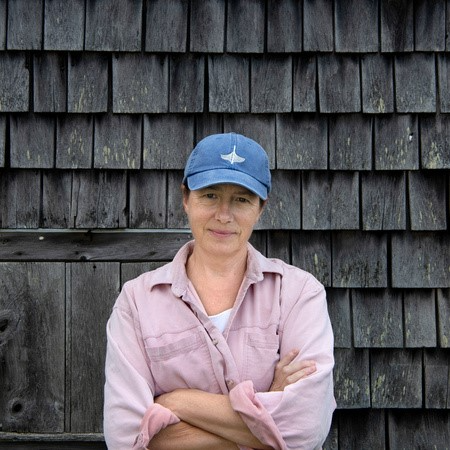Heather Cox Richardson

Each evening for the past four years, Heather Cox Richardson ’80, a professor of American history at Boston College, has written her take on the day’s news. In 1,200 or so measured and factual words, she places contemporary politics in a wider historical context. Her observations — published in her online newsletter, Letters from an American — have been described as a breath of fresh air in a time riven by so-called “fake news” and partisan politics.
Some days, at the end of a news-jammed week, Richardson takes a break, posting a cool photo of a lake or a sunset captured by her husband, Buddy Poland.
More than 1.1 million people subscribe to Richardson’s newsletter. Richardson is also the author of six books on U.S. history, the American West, and the Plains Indians. Her latest, Democracy Awakening: Notes on the State of America, traces aspects of U.S. history from pre-Revolutionary days and addresses why American democracy is in crisis and how we can move forward. We caught up with Richardson before the book’s publication in September.
There seem to be two main parts to this book: One centers on authoritarianism, and the other addresses how marginalized people have long demanded equity and have worked to push democracy forward. How did you select that structure?
Well, including the Trump section, the book has three parts. But originally, it was going to be a series of essays slightly longer than my newsletters. Then I realized we had an opportunity to rethink the way we think about American history. I wrote the 30 chapters and put them aside. When I picked the book back up, I ended up rewriting about 80% of it, answering questions that people have asked me about how the parties switched sides, what it means to be conservative. The thing about the section on the Trump administration that really shocked me, really still shocks me, is that if you strip out all the noise — and the noise is what I tended to write about every night — it’s really stark: It was really a stark climb toward authoritarianism, which I don’t think had been as clear to me when I was in the thick of it.

In some ways, we still are.
The trick is helping people see what American history has always been, that it has always been inclusive. Not that people have always been treated equally — absolutely not. But American history does not belong to a radical white right wing, and it never has. The book became this journey from how we got to the present, what the present looks like, and how we get out of it. It looks at how authoritarians can overturn a democracy, and it argues that the way they do so is by manipulating language and history. It’s not the book I set out to write, but in a way that’s appropriate. It’s the book that I was pushed to write by the people who read me, and so it reflects them more than me.
Your writing tone is the same in the book and the newsletter: accessible, relaxed, engaging. How do you stay so calm while so many are shouting at the television?
Everything I do is a journey to understand. I like to understand things — and we get that from Exeter, right? But that doesn’t mean I have to agree with them. That’s another thing that Exeter taught me. I enjoy intellectually arguing; that’s my happy place. I like testing out new ideas. And I like having my feet under me. When people say I’m calm, that’s really just me looking to understand. Once your feet are under you, once you understand something, you can make good decisions about it. For me, understanding brings calm.
Have other aspects of Exeter stayed with you?
Friendships have lasted eternally: I was in Soule in that short window when Soule was a girls dormitory, and we still call ourselves the Soule sisters. And Exeter taught me to speak my mind: I didn’t understand the degree to which the Harkness method was unusual, how everyone participates, but that has absolutely been my approach to my career, and what I now take into my own classes. I also learned to recognize that if you failed, you just got up and did it again the next day a little bit better: doing poorly or failing was not the end. Also, every Friday in English class, we would have an in-class writing: you had to write for an hour about a prompt on the board, and I loved that. Quite frankly, my Letters from an American are a daily in-class writing — that’s exactly where I learned how to do that. I loved the challenge of writing a coherent essay on ‘black and white’ or on Virginia Woolf ’s use of blue in To the Lighthouse, or whatever. I thought that was just the most fun thing ever, and I get to do it every night.
Is there a particular moment of history that’s important for students today to understand?
Any story that makes them feel empowered. Something I think we’re missing when we look at how the radical right is changing education — especially historical education — is we talk about how they’re erasing minority voices. But I think it’s more than that. I think what they are erasing is the idea that individuals can advocate for different kinds of society, the idea that you can make a difference. And you can — I mean, look at what has happened recently as people have started to speak up for democracy. That’s the piece I think it’s important for younger people to understand. And that message is actually coming from young people now: the Tennessee Three and David Hogg and Victor Shi. Young people are saying, “Hey, we can make a difference.” So I say, any story that tells kids, “You can matter.”
Who else inspires you?
There are some phenomenal journalists: Zack Beauchamp, Dahlia Lithwick, Ian Millhiser, David Rothkopf. The can’t-miss on general culture is Rebecca Solnit. Dear God, that woman is smart. Her latest book, Orwell’s Roses, is brilliant in terms of its humanity, its history, its science. There are an awful lot of voices out there that are really smart, which is an exciting thing after many years in which it felt like smart voices were not getting oxygen. It feels like we’re in a renaissance, not just of words but of music and art. For all that there’s a lot of terror out there and reasons to be frightened, you look at the outpouring of talent — around the world and certainly in America — and you think: “Really? Are we going to bottle that up?” I mean, tell me what that looks like. I can’t see a way you do that.
What are your plans for the newsletter?
The newsletter started organically and it will end organically, though I have committed to going through the election. There will come a time when we don’t need it any longer. And that’s kind of the beauty of being a teacher, right? If you do your job really well, nobody needs you anymore. And I am a teacher at heart. My dream is for someone to go: “Hey, remember that woman? What was her name again?” Because that would mean I’ve done it right.
— Daneet Steffens ‘82
Editor’s note: This article first appeared in the Fall 2023 issue of The Exeter Bulletin.


